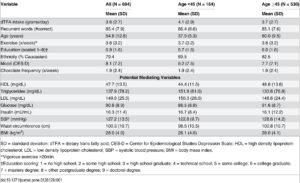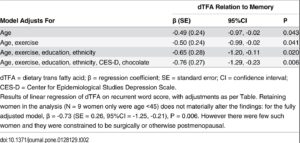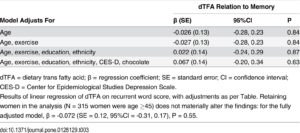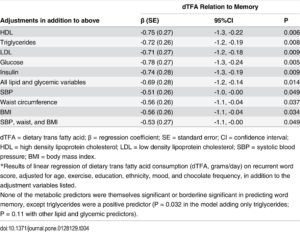
Eating cakes and biscuits appears to impair memory.
Research (1.) suggests that there is relationship between consumption of dietary trans-fats and word-memory.
1018 individuals were given word recall tests that were scored and matched against the amount of trans-fats consumed by each individual.
The results are worth remembering next time you reach for the cookie jar. Every gram of dietary trans-fats consumed per day was associated with an estimated 0.76 fewer words recalled.
Is this causation or just correlation? The researchers consider that the pro-oxidant (2.) and energetic detriments of dietary trans-fats (3.) are evidence of causation. They used triangulation (4.) with other evidence to ensure that other causal factors were not being mistakenly included. (See charts below if you are interested in the statistical data).
Trans-fats are found in many biscuits, cakes and other processed foods. They are made by pumping hydrogen into liquid vegetable oil so that the oil becomes more solid. Food manufacturers do this in order to increase the shelf life of the products and to improve flavour and texture. You will know that they are present in products if you see the words “partially hydrogenated oils” on the ingredients list.

The leader of this study, Dr Beatrice Golomb, said: “Trans fats were most strongly linked to worse memory, in young and middle-aged men, during their working and career building years…From a health standpoint, trans fat consumption has been linked to higher body weight, more aggression and heart disease…As I tell my patients, while trans fats increase the shelf life of foods, they reduce the shelf life of people.” (5.)
What does this mean for our love affair with biscuits and cakes?
Well, it appears that we love them but they don’t love us. Maybe the best thing to do is to forget about eating them before they make us forget that we have eaten them…
References, Definitions & Data



